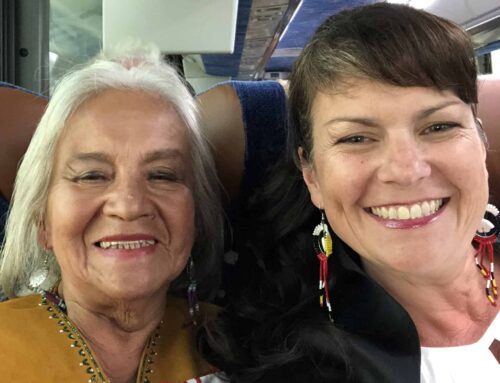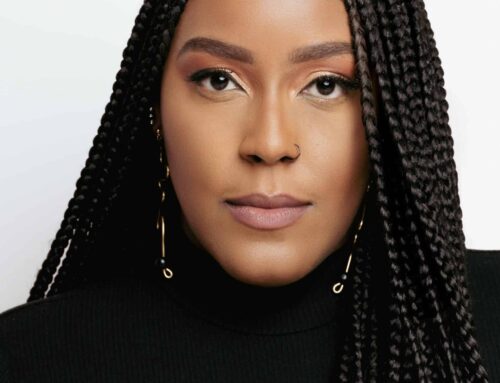This is the fourth post in our Confidence Stories series in partnership with Always®. Confidence Stories features stories, tips and ideas for supporting girls and building confidence.
At the Canadian Women’s Foundation, we want every girl to believe in herself and realize she matters. Every day we work to better understand the challenges that girls face and invest in the programs that help girls move into adolescence with confidence.
My work at the Canadian Women’s Foundation gives me a unique advantage as the parent of a 5-year-old girl: I have the ultimate guide to raising girls right at my fingertips! I know that the evidence-based approach to investing in girls’ programs WORKS. I’ve seen the impacts in the research, in the Foundation’s results, and in my daughter.
In talking to colleagues who are also parents of girls, I realized through the combination of our role as parents and our experiences working for an organization that helps empower girls, we could provide meaningful support to other parents.
Following are tips, experiences and ideas from 6 of us to help you and your daughters navigate the challenges they face with confidence.
We’d love to hear your experiences too. Share your advice for raising girls with confidence in the comments!
Tip 1: Encourage participation in sport by helping her find an activity that fits her personality
Beth (21-year-old daughter)
As my kids were growing up, we always seemed to be rushing to soccer, swimming or hockey. All that began to change when my daughter reached the age of 13 or 14. She had less interest in participating in organized sport, just when I knew it was critical for her to stay active. The exception was hockey – we had found a league and coaches that focused on team participation, having fun, supporting your team mates, and being positive role models for younger players – a perfect fit for her personality.
My suggestion for parents is to find an activity or sport with an approach or philosophy that matches your daughter’s personality. Sometimes it will be hard work to find that right fit – but it’s worth it. My daughter is still playing intramural hockey in her fourth year of university!
*For more tips on keeping your daughter engaged in sport, see Dr. Jen’s Tips to Keep Girls Playing #LikeAGirl.
Tip 2: Communicate through listening and validation
Heidi (9 and 7-year-old daughters)
In our home we talk constantly, listen attentively and validate each other’s feelings with empathy.
My 7-year-old daughter was told by a peer that she wasn’t good at math. The math exercise at school that day took a little more focus, so this comment went right to her heart and she felt terrible. She came home crushed and very quiet.
When she felt ready to talk, I focused on listening and making sure she felt heard. This led us to a positive and open conversation about how EVERYONE has their strengths and areas of growth. We discussed how math may require more effort for her, but she is very heart smart (empathetic) and kind. She didn’t recognize that strength (being heart smart) until we talked about it.
She went to school the next day and told her peer that she’d be glad to help them be more heart smart if they would help her with math. Through this positive, open approach to communication, she felt validated, identified a personal strength (even if it’s different from others), and gained new confidence.
Tip 3: Help her find her voice
Victoria (10-year-old daughter)
My daughter was having issues with a “bully-friend” for a few years and it was taking a toll on her mental health. She is typically a shy and sensitive girl, and doesn’t like to hurt anyone’s feelings. Since she didn’t want me to interfere by speaking with the other girl’s mother, I opened up a series of conversations with her about standing up for herself. I found what was most useful was, rather than giving her answers, I gave her my undivided attention when she was speaking with me about these issues, lots of cuddles, and examples of my experiences when I was a little girl. I also bought her the book Stand Up for Yourself & Your Friends, which she used as a constant resource. I’m happy to say she is now much more assertive and isn’t afraid to speak her mind.
Tip 4: Teach her to recognize the beauty of diversity
Mar Win (20-year-old daughter)
I told my daughter when she was starting kindergarten “don’t be discouraged by being told that you are different because of the colour of your skin. Stand up and be brave because there is only one colour in our heart.”
She was the only girl of colour in her class. One of her classmates didn’t want to play with her for this reason. My daughter stood up to the girl and told her "I am different but I am nice in my heart".
She ended up making more friends because they all wanted to be friends with the kind girl.
Tip 5: Reinforce the strength of her character, not her appearance
Chanel (9-year-old daughter)
There is a Jamaican saying that goes: ‘Wi lickle but wi tallawah’. The English translation is ‘We're small but strong’.
My daughter has always been the smallest in stature in her class through Grades 2 and 3, and now in Grade 4. We noticed that family, friends, and even strangers would, without hesitation, offer their opinion on how small, little or "cute" they thought she was. We responded to this by giving her a counter-message: we told her “yes, you might be physically small, but you are strong, smart and your voice matters.”
She has embraced this message and uses her assertive voice when needed. We love to see her strong and positive attitude in her interactions with her older brother, peers and at the karate dojo. She enjoys public speaking and doesn't shy away from trying new things. If she does have a bad day or feels discouraged, we simply go back to this saying and remind her again: ‘Wi lickle but wi tallawah’: you are small but mighty/brave/bold/smart/determined – whatever word best works for the moment.
Tip 6: Encourage her to think critically about media and question what’s “normal”
Sarah (5-year-old daughter)
Don’t get me started on the media and its dismal representation of women and girls. I realized early on that trying to protect my daughter from the negative media messages that are quite literally everywhere was a fruitless exercise. Instead of covering her eyes, I encourage her to ask questions so she can recognize her power to challenge the limiting messages she’s being fed.
I started with her when she was quite young, but I kept it simple. If she was watching an animated show and pointed out an animal character as being a girl for instance, I’d ask “How do you know that’s a girl?” Her answer would invariably be “she has eyelashes” and I’d respond playfully with questions like “wait a second, boys don’t have eyelashes?” I could see the wheels turning and noticed that asking led to consideration and an interesting conversation, where telling usually led to contradiction: e.g. “pink isn’t just for girls”. “Yes it is”. “No it isn’t”. “Yes it is”… (continue ad infinitum). Now that she’s in school and has much higher exposure to media and peer influence, the questions have become more frequent and more complex, but I notice she’s asking questions on her own without prompting.
I’ve also started showing her examples in the media that do the same thing we do at home: ask questions and challenge the status quo. The best example of this, bar none, is the incredible #LikeAGirl campaign from Always. And of course, she knows all about #GirlPowered, the most recent campaign from the Canadian Women’s Foundation that encourages girls to take control of the media messages they see by creating their own. I also regularly turn to helpful resources like Packaging Girlhood, A Mighty Girl and Amy Poehler’s Smart Girls.
Though I’m positively blown away by the confident, curious, and assertive girl she is becoming, I don’t deny there are still heart-wrenching moments that discourage me, and remind me of the height of the wall we’re trying to tear down. However, I’m determined to meet each one of those moments with the same curiosity and critical thinking approach we’ve been taking all along.
This is the fourth post in our Confidence Stories series in partnership with Always®. Confidence Stories features stories, tips and ideas for supporting girls and building confidence.
Learn More
- Confidence Doesn’t Always Come Naturally – Even When You’re an Olympic Athlete
- Tips to Keep Girls Playing #LikeAGirl
- Stopping the Drop in Girls’ Confidence
Take Action
- Ask a girl in your life what #GirlPowered message she'd like to send to girls around the world and share via www.girlpowered.ca!
- Sign up for our e-newsletter to have our latest stories and resources sent to your inbox.
- Follow us on Facebook and Twitter to join a national conversation on empowering girls.








Leave A Comment
You must be logged in to post a comment.